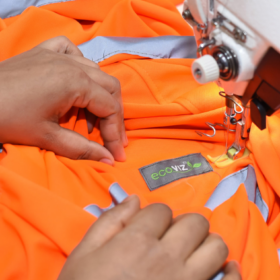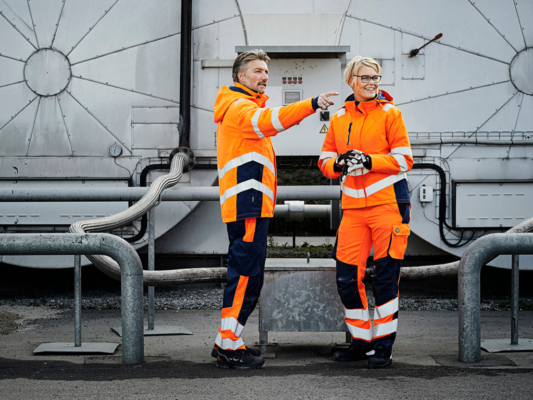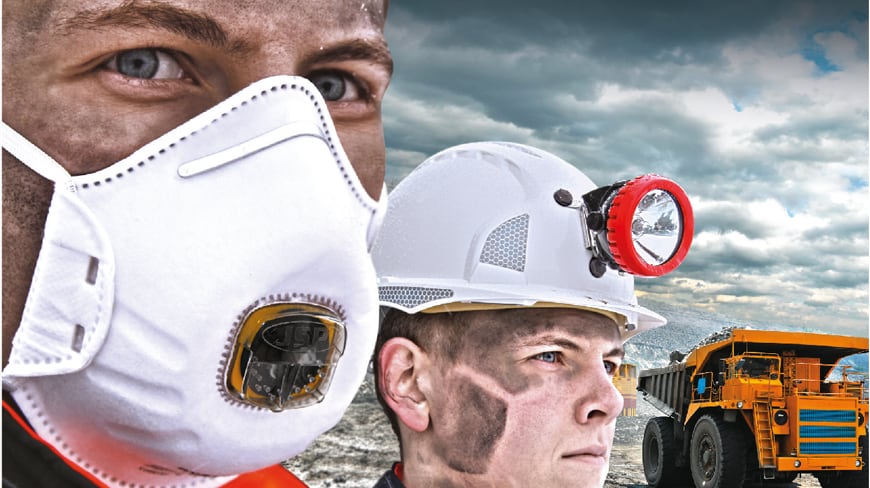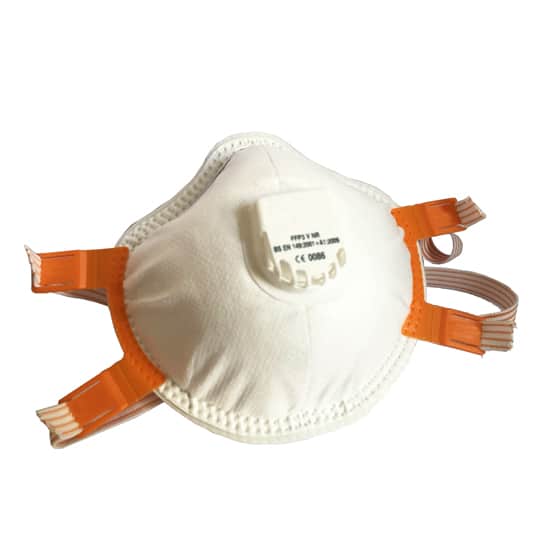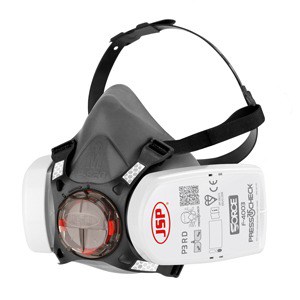No products in the basket.
PPE, Respiratory Protection
Which Face Mask Do I Need?
Workplace respiratory exposure hazards are encountered in four forms; solid particulates, liquid particulates, gases and vapours. Regularly breathing in these contaminants over an extended period of time can cause a variety of illnesses, including asthma, lung disease and cancer. Typically, it can take several years for the effects of respiratory hazards in the workplace to develop, with symptoms not arising until several years after exposure, which can ultimately lead to long-term debilitating illnesses or early death.
Ensuring respiratory protection for yourself and any workers you are responsible for against the effects of respiratory hazards is therefore imperative.
Determining which piece of Respiratory Protective Equipment (RPE) is correct for the job requires the consideration of a number of factors including, the nature of the hazardous substance(s), whether the task will be carried out in an oxygen deficient atmosphere, the relevant COSHH guidance from HSE and the safety data sheets published by the supplier of the hazardous substance. It may be necessary to consult various sources and guidance to find the most appropriate mask for the job (which is outside the scope of this blog) however the following RPE is regularly purchased for a variety of everyday working environments including those within construction and utility settings.
FFP2 and FFP3 masks
FFP2 and FFP3 masks are two grades of mask classified under the ‘EN 149 European Standard of Testing and Marking Requirements of Masks that Filter the Air’.
The FFP part of the mask description simply stands for ‘filtering face piece’ with the number following the letters indicating the level of protection the mask will provide against toxic, infected, and deleterious kinds of dust, smoke, aerosols, oncogenic and radioactive substances or pathogens such as viruses, bacteria, and fungal spores.
Each mask will have an Assigned Protection Factor (APF) – the workplace level of respiratory protection that a respirator, or class of respirators, is expected to provide to employees when the employer implements a continuing, effective respiratory protection program.
The higher the number listed after the ‘FFP’ letters, the greater the level of protection. An FFP2 mask provides an APF rating of 10 and an FFP3 mask the greater level of protection with an APF of 20.
FFP2 Mask
These disposable masks are defined as being composed of three layers of synthetic non-woven material, available in different thicknesses, with the inclusion of filtration layers between each layer. The masks are not shaped to your face but are simply held in place by the elastic ear loop and have a typical lifespan of 3-8 hours depending on environmental factors.
Studies cited by the World Health Organisation, shows this filtration system to be highly effective, the FFP2 masks filtering a minimum of 94% of airborne particles and a maximum of 8% leakage to the inside of the mask.
The figure is achieved by testing masks using sodium chloride particles and paraffin oil. Whilst standard medical masks only filter 0.3 micrometre droplets, FFP2 respirator masks filter down to 0.075 micrometre solid particles. The masks are then tested by seeing what percentage of these small particles make it through. To receive FFP2 certification, only 6% or less may do so.
FFP3 Mask
FFP3 masks provide the higher level of respiratory protection, filtering approximately 99% of airborne particles, with a maximum of 2% leakage to the inside.
These masks are better shaped to your face for a more snug fit and typically have a valve to help breathe as the filtration material is much thicker. The valve also reduces the build-up of moisture, lengthening the lifespan of the mask. FFP3 masks are typically used within construction environments and are particularly suitable for use when handling asbestos.
CLAD-Z FFP3 Valved Cup Respirator
HZA-5030
- Traditional convex shape with nose clip
- E-Valve design provides cooler and more comfortable wear
- Inner face-seal ring for improved face-fit
- Reliable and effective protection against fine particles with high performance filter material
- Durable, collapse resistant inner shell
- Comfortable and lightweight 4-point adjustable straps
- Latex free
- Conforms to safety standard EN 149:2001+A1:200
Half-Mask Respirator
Respirators are reusable and can be easily stripped, cleaned, maintained and reused for an indefinite period of time. The replacement filters, whilst not indefinite, last far longer than single use disposable respirators. We recommend 1 – 3 days for high use, 3 – 5 days for medium use and 28 days maximum for light use.
The cleaning process is very simple and straightforward, comprising of disassembly, cleaning with soapy water, drying ad reassembling (replacing filters where required).
Force 8 Half-Mask With PressToCheck P3 Filters
HJS-BHT0A3
Offers protection against construction dust and has passed the Dolomite clogging test (offers better breathing resistance over a longer period).
The Force 8 Half-Mask with PressToCheck is made with durable thermoplastic rubber offering a superior fit to most face shapes. The mask accepts the full range of low profile Force8 filters giving it the flexibility to be used for a variety of applications, providing filtering protection against particulates, many gases and vapours.
- Fully adjustable 4-point cradle suspension harness with quick-release buckles ensuring an effective facial fit
- Reflective strips create increased visibility in low-light environments for added safety
- Low resistance exhalation valve for easy breathing, with stable mask configuration
- Cost effective Force™ 8 filters available with low profile angle for minimum visual impairment.
- Conforms to EN140 (Face piece), EN14387:2004 (Filter performance), EN143:200 (Filter performance)
Qualitative Face Fit Testing Kit
It is important that a ‘tight-fitting’ mask is face fitted as there must be good contact between the skin and the mask for it to be fully effective.
The Face Fit Test Kit enables a qualitative respiratory fit test for tight fitting respirators in line with COSHH and Approved Code of Practice (ACoP) regulations for the mandatory testing of RPE.
Testing should be undertaken by a qualified fitter who possesses the necessary skills, knowledge and experience.
Clad Safety has been operating for over 30 years and takes pride in the excellent service that we offer to our customers. Our product range, combined with expert technical advice allows us to offer valuable workwear solutions. For further information or to find out more on how Clad Safety can support your PPE needs please contact our Customer Service Team on 0800 161 3661 or email [email protected].
